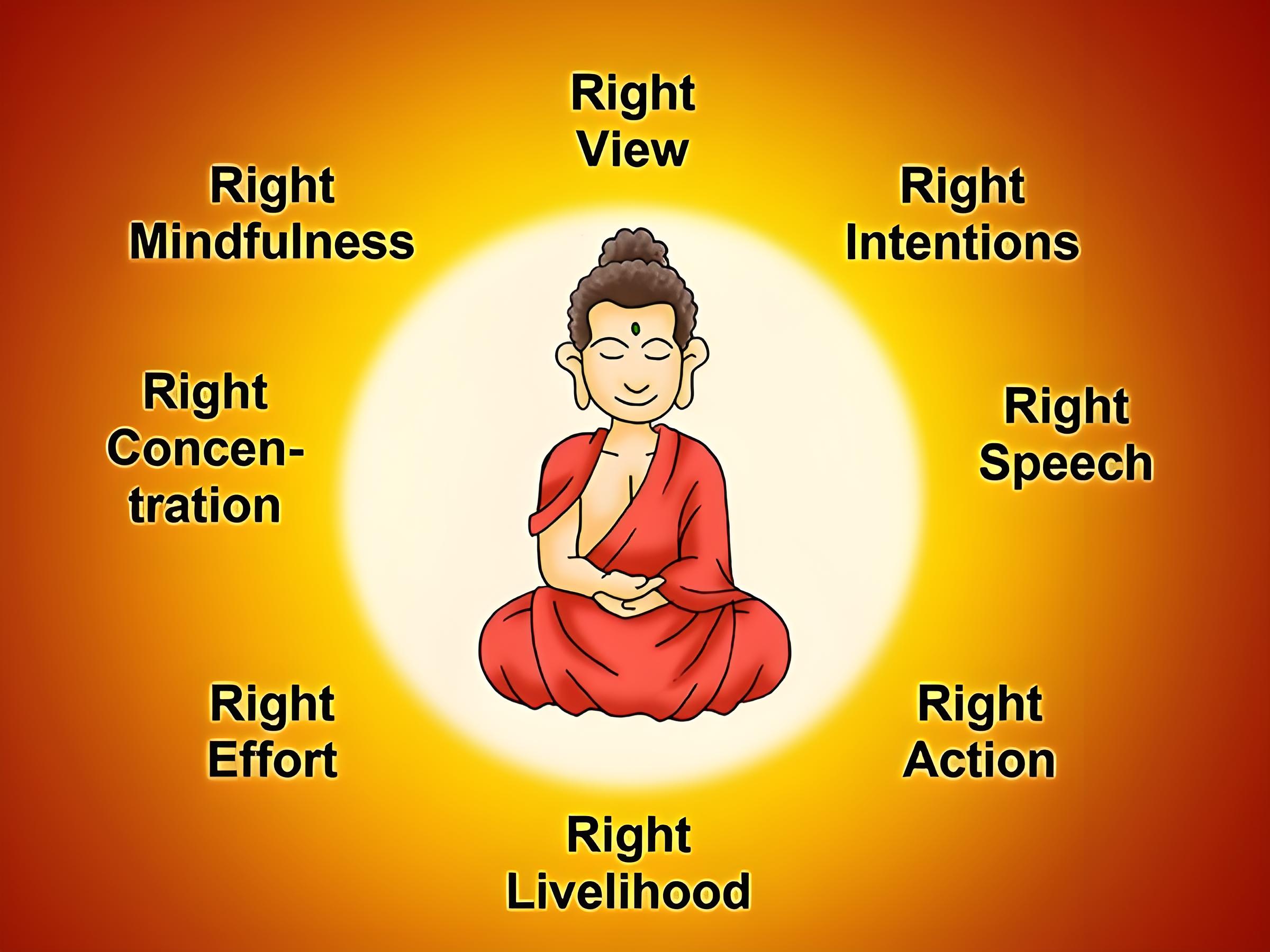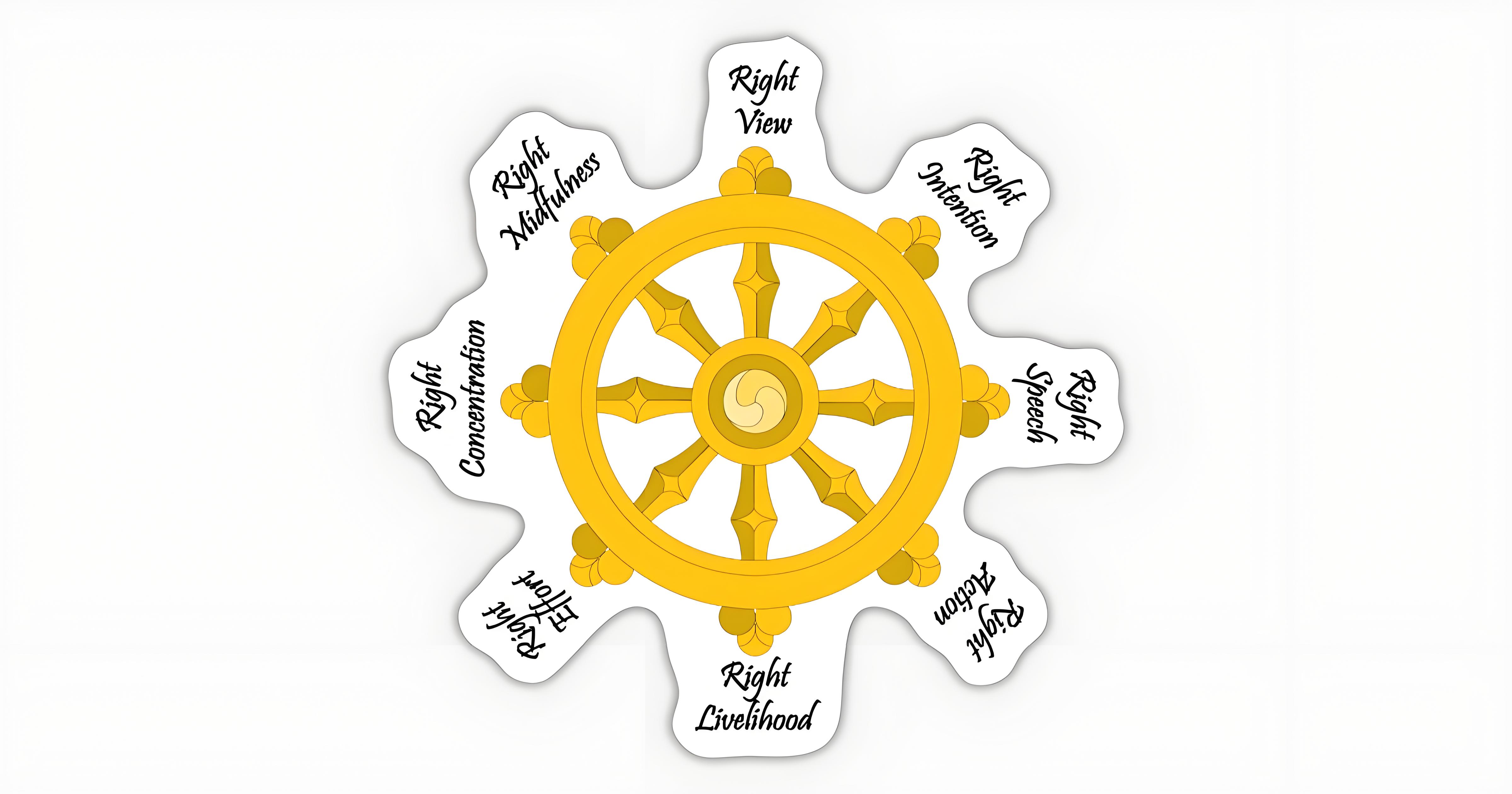The eightfold path is a central concept in Buddhism. It offers a practical guide to end suffering. This path isn’t about rigid rules. Instead, it’s about cultivating wisdom, ethical conduct, and mental discipline. The path promotes a balanced and compassionate way of life. Ultimately, it leads to enlightenment.
Understanding the Eightfold Path Definition
The eightfold path definition is rooted in the Four Noble Truths. These truths explain the existence of suffering. Furthermore, they outline a way to overcome it. The path provides specific steps for this process. The eightfold path is often represented by a wheel with eight spokes. Each spoke symbolizes a key aspect of the path. These aspects are interconnected and work together. They create a holistic approach to spiritual development.
The Three Main Divisions of the Eightfold Path
The eight elements of the path fall into three categories. These are wisdom (Prajna), ethical conduct (Sila), and mental discipline (Samadhi). Firstly, wisdom involves understanding the true nature of reality. Secondly, ethical conduct focuses on moral actions. Finally, mental discipline aims to train the mind. Thus, these three divisions support each other on the path to enlightenment.
Wisdom: The Foundation for Transformation
The first two elements of the eightfold path fall under wisdom. They are right understanding and right thought. Right understanding means comprehending the Four Noble Truths. It involves seeing the world as it is, without delusion. Moreover, right thought involves cultivating positive and compassionate intentions. These two principles form the basis for all other aspects of the path. They help to make mindful choices.
Right View: Seeing Things as They Are
Right view involves grasping the nature of reality. It includes recognizing the impermanence of all things. It also means acknowledging the existence of suffering. This view is not merely intellectual. It is a deep, experiential knowledge. It guides our actions and decisions. Moreover, it promotes a clear and accurate view of the world. This helps us to avoid attachment and suffering.
Right Intention: Cultivating Positive Intentions
Right intention involves cultivating positive mental states. Specifically, it means developing thoughts free from greed, hatred, and delusion. Furthermore, it involves fostering intentions filled with love, kindness, and compassion. By focusing on wholesome thoughts, we align our minds with the path. Therefore, it is essential to choose thoughts wisely. This, in turn, influences our actions and interactions.
Ethical Conduct: Living a Moral Life
The next three parts of the noble eightfold path comprise ethical conduct. These are right speech, right action, and right livelihood. Right speech encourages truthful and kind communication. Right action means behaving in a moral and compassionate manner. Right livelihood focuses on earning a living ethically, without harming others. These actions create harmony within ourselves and the world. They are designed to reduce suffering.
Right Speech: Truthful and Kind Communication
Right speech involves being mindful of what we say. It means avoiding lies, gossip, harsh language, and idle talk. Instead, it encourages us to speak truthfully, kindly, and purposefully. Consequently, our words can either hurt or heal. Therefore, it is important to be mindful of their impact. Right speech fosters respect and understanding. This contributes to a more peaceful environment.
Right Action: Behaving Morally and Compassionately
Right action means behaving ethically. This includes not harming others. This includes not stealing or engaging in sexual misconduct. It promotes conduct that is helpful and compassionate. Specifically, it means respecting all life. Furthermore, it involves living in accordance with moral principles. Therefore, our actions should be a reflection of our values. As a result, our deeds should bring benefit to ourselves and others.
Right Livelihood: Earning a Living Ethically
Right livelihood involves choosing a job that doesn’t harm other beings. It discourages professions that involve killing, stealing, or dishonesty. Instead, it promotes work that is honest and beneficial. This helps one to live a life consistent with Buddhist principles. Therefore, choosing the right career path is essential. This aligns our daily activities with the path to enlightenment.
Mental Discipline: Training the Mind
The final three elements of the eightfold path are related to mental discipline. These include right effort, right mindfulness, and right concentration. Right effort involves cultivating positive states of mind. Right mindfulness focuses on developing present moment awareness. Right concentration involves focusing the mind through meditation. These practices lead to mental stability and wisdom. This is essential for spiritual growth.
Right Effort: Cultivating Positive States of Mind
Right effort involves making a conscious effort to cultivate good qualities. This includes preventing unwholesome thoughts and actions. This also encourages cultivating wholesome ones. It’s about actively working on ourselves. We continuously strive to improve and grow. This is an ongoing process. It requires dedication and perseverance. By making the right effort, we move closer to enlightenment.
Right Mindfulness: Developing Present Moment Awareness
Right mindfulness means being present in the moment. This includes paying attention to thoughts, feelings, and sensations. It is without judgement or reaction. This is cultivated through meditation and daily practice. By developing mindfulness, we become more aware of our experiences. Furthermore, it allows us to respond with greater clarity. Consequently, we avoid getting caught up in negative patterns.
Right Concentration: Focusing the Mind Through Meditation
Right concentration involves focusing the mind. It develops one-pointed concentration. This is achieved through meditation. It allows the mind to become still. It helps us gain deeper insights. This practice enhances our mental clarity and stability. Ultimately, it leads to wisdom. Moreover, it allows us to experience a more profound connection.
The Interconnectedness of the Noble Eightfold Path
The noble eightfold path elements are not isolated steps. Instead, they are interconnected and interdependent. Each aspect supports and strengthens the others. For instance, right understanding supports ethical conduct. Ethical conduct, in turn, enhances mental discipline. Consequently, the path works as a whole. This brings about a holistic transformation. This is a necessary step toward enlightenment.
Practical Application of the Eightfold Path
The eightfold path is not just an abstract concept. It is a practical guide for daily life. By applying these principles, we can improve our relationships. Also, we can achieve greater inner peace. It provides tools for self-reflection and personal growth. Furthermore, the path is open to anyone. No matter their background, they can benefit from this practice. It’s a journey that requires commitment and intention.
Embracing the Journey of the Eightfold Path
Embarking on the eightfold path is a lifelong journey. It is not a destination. There are no quick fixes. Progress comes through steady effort and mindful practice. Therefore, it is essential to be patient with ourselves. The path offers a way to cultivate wisdom. Also, it encourages us to live with kindness and compassion. The result is a life filled with purpose and meaning.
The Eightfold Path as a Guide
The eightfold path serves as a roadmap to overcome suffering. It guides us through different aspects of life. This includes understanding, ethical action, and mental discipline. By consistently applying these principles, we can live more mindfully. Moreover, we can create a more peaceful world. This is a journey of self-discovery and transformation. Therefore, it is a path worth exploring.


